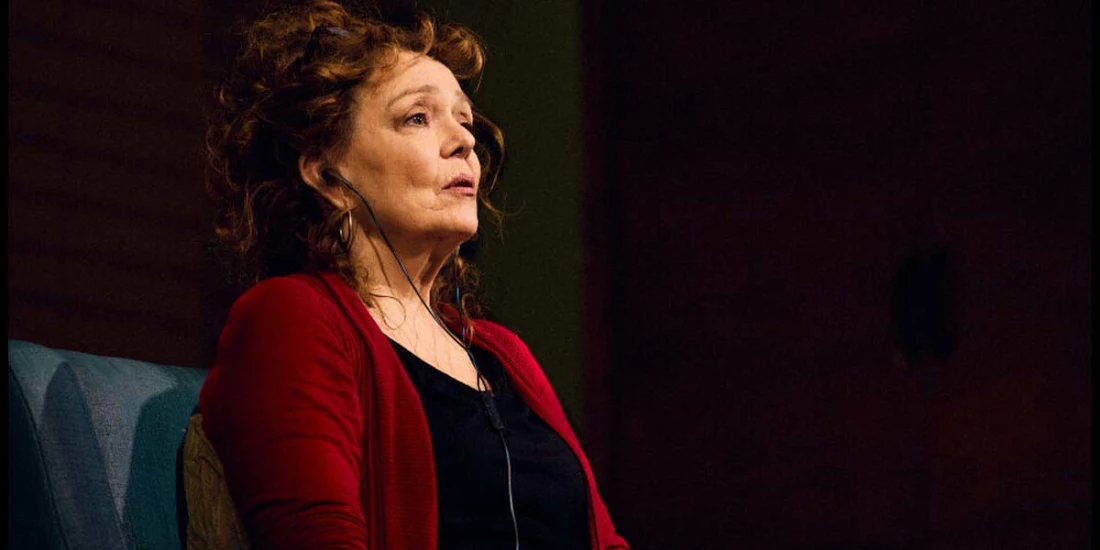'Dana H.' review - an affecting, 'spectacularly executed' work
According to the burlesque dancers in the musical Gypsy, the secret to success is having a gimmick. But entertaining as their words are, one wonders if a coup de théâtre can sustain an evening-length performance, particularly when the one-trick pony involves lip-syncing?
The answer is absolutely if you're the legendary drag artist Lypsinka ― who uses lines from classic Hollywood films to scintillating campy effect. That said, lip-synching lends itself well to bizarre and comedic entertainment; so what do you get when it's used to unearth the horrors of state sanction sexual assault? Under the incisive direction of Les Waters, a scalding masterpiece that reveals how willingly our legal system caters to violent bullies.
That's the essence of Dana H., which recently debuted on Broadway at the Lyceum Theatre after having previously astounded Off-Broadway audiences at the Vineyard Theatre in early 2020 before Covid-19 shuttered the industry. As was the case two years ago, the show's secret weapon is Deidre O'Connell, who channels the horrific, real-life story of Dana Higginbotham's months-long kidnapping, abuse, and repeated rapes in this documentary play.
At the top of Dana H., O'Connell enters the stage, which has been designed by Andrew Boyce to resemble a simple budget motel room. She sits in a chair that has been placed at center stage, where she is outfitted with an earpiece by a stagehand. After giving him thumbs up that everything is okay, she blinks and transforms into a world-weary survivor attempting to convey a sense of calm that will never be sincere.
We see it in the way that she crosses her arms while holding onto a printed manuscript of her story, as if it might shield her from life's capricious, concussion-inducing punches to her head. It's a subtle shift, though the true alchemical transformation begins after we hear the recorded sounds. Initially, one imagines that there is something wrong with the sound system ― that's how uncannily specific O'Connor's choreographed performance is in matching up with what we hear. But we soon realize that she is simply embodying Higginbotham's recorded words as if they were emanating from her body.
This includes the sounds of patting a chair, shuffling papers, or jangling her bracelets; that's how perfectly in-sync O'Connor is with the sound of Higginbotham. This is more than mere mimicry or precise facial expressions; this is a full body experience that transcends imitation.
Higginbotham originally recounted her ordeal to the writer Steven Cosson, who recorded their conversation. That interview was reconfigured by her son, playwright Lucas Hnath, into Dana H. Through his ears, we hear his mother's harrowing account of survival as well as a devastating indictment of the complicity of men who failed to help her, despite the clear evidence in her bleeding, tortured, and broken face that everything was wrong.
These men were not only civilians ― they were often police officers, who according to Higginbotham's testimony conducted the mental calculus of going up against a member of the violent Aryan Brother gang of south Florida and determined that her sacrifice was more important than doing their jobs if it meant maintaining an unstable peace.
The plot of Dana H. is simple: The play revolves around a former chaplain who details her in-plain sight kidnapping and enslavement by a former patient who latches onto her. More than the horror of Higginbotham's experience, the play makes clear that this could and likely does happen to millions of women across the country who lack the resources to protect themselves.
During one particularly disgusting moment, a police officer informs Higginbotham that it is simply her word against her abuser's, despite her bruises. Though her eventual escape gives one joy, that it occurs through luck rather than design of our legal system is equally revolting.
As Higginbotham explains, and which O'Connor embodies with an air of reluctant defeat, she had no money or support from the people around her. Her story is far from unique. One hopes that by speaking it to Broadway audiences, many people will hear her and harangue their elected officials to pass long-pending, common-sense, domestic violence laws so that victims and survivors are given the assistance they deserve to escape their cycle of suffering and death.
I recently reviewed a show and declared that talk business does not belong onstage. Dana H. has forced me to eat my words and to accept that there are no absolutes in theatre, particularly when the story is horrifically affecting and spectacularly executed as this show is.
Dana H. should be required viewing for legal scholars, law enforcement officers, and aspirants across the country, if only to remind them that depravity reigns when they fail to do the right thing.
Dana H. is at the Lyceum Theatre. Get Dana H. tickets on New York Theatre Guide.
Photo credit: Deidre O'Connell in Dana H. (Photo by Chad Batka)
Originally published on
